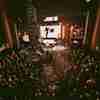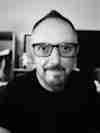Tom Astley-Williams
A scan of what's happening in the city of Los Angeles nightlife listings, and you'd never guess that the same person promoting a tropical house pool party is also behind an emo/pop-punk night. Or that they used to be part of a hyper-successful dubstep duo and that instrumental in spreading the genre across the United States and spent their teenage years tearing up the dancefloor at drum 'n' bass clubs in the UK.
Tom Astley-Williams ticks all of the boxes, as well as that of manager, DJ, and audio engineer—in a pinch. Raving from long before he should have been allowed out after dark, Astley-Williams put his nightclub education to good use. And it's paid off with journeys down a variety of avenues in music.
He spoke to Festival Insider about pivotal moments in his life that guided his decision-making as he navigated his way through his winding path in the music industry.
What was your first exposure to electronic dance music?
I started raving in 1996, when I was 14, when drum 'n' bass was probably at its prime. I was aggro and ruthless enough to attempt to get into the clubs in London, and I did. I started raving weekly, and drum 'n' bass completely ruled my world until 2005.


Wicked Paradise
Were you formally working in the industry at any point during this phase?
As I went to university, all of my friends started interning at record labels, creating their own, or becoming producers. I was just a raver, and because we went out every single weekend for a decade, I became very close to a lot of the DJs and labels in the scene.
I tried to dabble in the production realm, but I was still too young and crazy. I didn't have the patience and mindset to be in creative mode. I did my degree in music technology and psychology and started cutting my teeth as an audio engineer. But to be honest, I was shit. Nothing I was making was worthy of putting out, and I wasn't finding my feet.
But you were DJing, even though you weren't producing?
I'd been DJing since I was 14, picking up gigs here and there. As much as drum 'n' bass, breaks, and the whole rave scene was important to me, so was hip hop. I grew up a turntablist and hip hop DJ. I used to pick up gigs in London playing funk, soul, hip hop, drum 'n' bass, a whole mixture of things. I started collecting vinyl when I was 12, and to this day, I have a huge vinyl collection, 15,000 deep.
How did you end up in the States?
A connection through a family friend was Grammy-nominated producer Andres Levin in New York. He worked with a whole host of big stars, and he offered me an audio engineering internship. I packed up my entire life and moved to New York for that internship. I never went back. I ended up being in New York for nine years.
Again, I was kind of a young whippersnapper. I was caught up in the lights and all the famous people in the studio and wasn't paying attention. I ended up learning audio engineering from Andres anyway. I learned Pro Tools, working a mixing board, being in sessions, and cutting vocals. I was definitely not skilled enough to mix down tracks, but I knew how to record, and I knew how to be an assistant to him.
But none of this was in dance music, correct?
It was all very Latin-based, Latin fusion, and Afrobeat. I still wanted to make dance music, and a couple of years after I moved to New York, I studied Ableton and Pro Tools and dived into producing myself.
How did you get into dubstep?
On a trip back to London, I was at Plastic People. I remember seeing Skream and Benga play acetates in a club that was completely pitch black. They had one candle next to the decks, and all I could hear was rumbling basslines with minimal snare hits. At that point, I was like, "Okay, this is what I'm going to do." Drum 'n' bass production is very, very intricate. Dubstep was very sparse and loose, and it had ragga samples and snare hits, and I was like, "I can do this."
For the next four years, I devoted myself to dubstep production and ended up releasing around 70 singles within the span of about four years on different labels. I just really went for it. I was in a dubstep duo with Jody Shires. We went by Hellfire Machina and started touring in the US.


How did this lead to you doing events?
Hellfire Machina was the first foray into doing events because I saw a massive gap in the US for bringing UK artists in the dubstep scene over. Drum 'n' bass guys have been going back and forth for years even though the scenes were very small. But dubstep was making a massive statement. We were the first to bring Skream and Benga, Caspa and Rusko. We were bringing them to New York and testing out our own events, and it just grew from strength to strength.
What was your promotions/events company?
It was called BFM: Bass-Fueled Mischief. We had residencies at Webster Hall, and we were bringing in a lot of the top dubstep artists at the time. Once dubstep started to really hit here, when Excision came along and turned the music on its head, it started to get a little bit harder. We were doing Dirtyphonics and Excision at the PlayStation Theatre in Times Square, and suddenly, we were doing 2000 people every month.
What made you step away from that scene?
We spent at least four to five years touring, promoting shows, and fully immersed in the dubstep culture in the UK and the US. By 2011/12, the music had changed so much that I couldn't carry on. I remember the last gig I played was a festival in Baltimore. I was 29, 30. I remember looking at the crowd, and there were a lot of kids. I saw quite a few overdoses. Dubstep had turned into a different thing. It was a lot of bros with their shirts off. Everyone was taking a lot of drugs, whether they were candyflipping or doing ketamine, which was synonymous with dubstep. It just turned into noisecore instead of the roots-y dubstep that I used to know.
I remember deciding just there at that festival; I'm out. I don't care about the money, the name, or the fame. This is not resonating with me anymore. My first child was on the way as well. I pulled the plug on the whole project the week after.
We were going to be playing a festival on Governor's Island with Snoop Dogg, and we were second headliner. It was about to be the start of something massive. A lot of our dubstep contemporaries, the ones who stayed on, have gone on to have very good careers. We could probably have done the same thing, but I knew sonically I was out. So I just ripped the cord and took some time off.
But you came back into the events space. How did that happen?
Once my first child came along, everything changed. I didn't want to be the artist anymore. When I first started touring, I had all of the energy. I could do three days of back-to-back gigs, get on a plane, play, get on another plane, play, meet a promoter for dinner. In the end, I'm a homebody. Being out all the time, there's a lot of drinking [and] late nights. It just started to weigh me down a little bit. I dropped off the face of the music industry for six months to reevaluate what I wanted to do. That's when I started opening my ears to other music.
I used to hate anything that was 4/4. After I gave myself permission to open my eyes, I went to my first techno rave. The crowd was actually people my age. It wasn't just people losing their mind, headbanging, and thrashing out. It was sophisticated. There were people dressed up nicely and people having cocktails. At that time, that's what I wanted. Suddenly, my love for house, techno, and disco just exploded, and I knew that's where I wanted to be next in my career. I knew this was the music that had longevity for me. My ears weren't bleeding after an hour of having my face melted off. I could be there for four hours and just groove, and I wouldn't get tired.


Did you come to Los Angeles to pursue that?
Yes. I started L'Affaire Musicale as an event production company to do limited, curated shows when no one was bringing a lot of disco to LA. We were one of the first to create tropical house nights. I went from doing 30 in 2013/14 when I first started the company, doing select things at Sound and The Regent, bringing in non-top 20 DJs to as of 2019, expanding and doing 300 shows nationwide.
How did the last couple of years affect what you were doing?
Things have changed dramatically for me in the event space. I don't know where it's going to go from here. It's not like we were going to stop, but I think for me, now, it's more about quality over quantity.


What are some of the regular events, and one-offs, you have happening right now?
I haven't felt right for the last year to go full force. We will be starting Memorial Day weekend with our Wicked Paradise boats series, doing boats out of Long Beach and Marina del Rey. We've continued to do it in Miami at Hyde Beach as well. We haven't found the right home for it at the club or pool level yet. Still looking for the right home. We'll have it locked in soon. That will be a main focus for the summer.
We have Riot! At the Disco, the emo and pop-punk night going on at 1720. Those have been sold out for the last six months. Eva's Playhouse is a themed event with house music all night long. I'm DJing that. That's at The Circle in Huntington Beach every two months. We found a niche for a certain kind of older crowd that likes to listen to house music. Every party has a theme, and a lot of people come in costume. It's just a cool little night for us elders to go and have fun to some house music.
I'm involved in two festivals that are on the books right now. Loving Life Festival, which is going to be in Downtown LA at Los Angeles Center Studio over July 4th weekend, and We Belong Festival, which just took place in Miami.
The last couple of years have refocused you in your management ventures.
The most enjoyable part of what I do now is development and music management. That's where I see myself going. I started managing in 2014. My first client was J. Worra. Now I've got a roster of seven or eight clients. DJ Soda comes from the K-pop world and is an impeccable DJ who flawlessly goes from hardstyle psytrance to gabber into future bass and dubstep. We have Return of the Jaded, No Pants Party, WizG, and I'm developing a new artist called Local Singles.
You don't stick with clients who are all in one genre of music.
It's pretty much across the board. I want to challenge myself. I think it keeps it interesting. It keeps it fresh for me. Once I get bored with something I'm doing, or if it starts getting stale, I start getting curious about other things. Even with my events, I don't just want to do the same event over and over again just because it's successful. I like to explore different things. It keeps me on my toes.


There is a natural progression from one to the next part of the industry you've been involved with.
From being a raver, a DJ, a promoter, knowing the agency side because I had an agent, knowing the management side because I had a manager. It was just the natural progression to where I am today.











